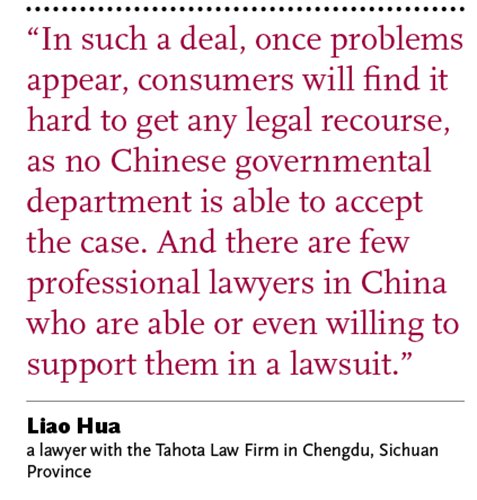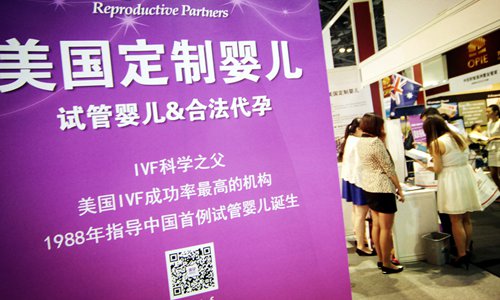○ Infertile woman heartbroken about seriously ill son born via surrogate brought back from Cambodia
○ Clampdowns on surrogacy in Cambodia, Thailand and India push Chinese consumers into a risky legal environment
○ Declining fertility rate in China sparks discussion over legalizing surrogacy

Photo: VCG
A Chinese woman surnamed Lin who paid 450,000 yuan ($69,200) for a baby delivered by a surrogate Cambodian mother now must face the uncertainty of her new son's life, as it was revealed upon returning to China that the child is suffering from brain atrophy.
Lin, a single mother, has thus far had to pay over 2 million yuan in medical treatment for her son, Chinese news outlet thepaper.cn reported. What's worse, in a country where "any form of surrogacy" is normally suppressed, there would be little to no chance for Lin to obtain legal support.
After the lifting of China's old one-child policy, a sharp increase in the number of older Chinese couples experiencing infertility turned many to assisted reproductive technology or surrogacy. While surrogacy remains illegal in China, resorting to surrogacy mothers in other countries has become an increasingly popular solution for Chinese women who cannot conceive.
Cambodia is a major target country among Chinese women seeking surrogate mothers due to the relatively lower costs and friendly legal environment. But Cambodia has recently tightened its regulations on surrogacy, which is pushing prospective Chinese parents into an even riskier situation when trying to safeguard their rights.
Lin signed a contract with a China-based agency that specializes in surrogacy business in Cambodia and Russia in March 2016 for the baby. After the tragedy occurred, she questioned the agency's obligation of delivering a healthy baby for her, blaming it for failing to provide necessary living conditions to the surrogate Cambodian mother, which she believes to have directly caused her son's illness.
The agency's "golden package contract" clearly states that it "guarantees the success of operation, healthy birth, DNA test and their return to China." But when Lin contacted the agency about her woes, they simply responded that they would "replace a new baby for her or arrange another surrogate birth, as long as it was verified to be their fault for causing the tragedy."

Accepting responsibility
Lin cannot imagine how a life - the life of her beloved baby - can be so easily rejected and replaced by the surrogacy agency. However, when the Global Times contacted the agency for a comment, it quickly changed its tone.
"If the child was not yet born, it is indeed possible to consider other ways to make a 'withdraw,' but not after the boy was born. Now it is only possible for the agent to fix the problem through negotiation, and make corresponding compensation. If the two parties fail to reach a deal, we may consider raising the boy ourselves, or applying to the relevant department for establishment of a welfare institution," said the agency.
Liang Bo, founder of the surrogacy agency, admitted that after several years in business, this was their first experience dealing with an unhealthy baby.
In a statement posted on its official Weibo account, the agency said they regard the health of their infants as their top priority, and that the cause of the baby's condition has not yet been confirmed. They promised to take responsibility and pay compensation, but only if it is the result of medical malpractice.
Other surrogacy agents interviewed by the Global Times all said that such an incident rarely happens in this emerging market, so very few of them have well-prepared emergency response mechanisms or protection systems in place.
Only three out of the eight agencies contacted promised that they would find third party hospitals to conduct tests in this kind of case. But when asked to provide more detailed information about these so-called "third party hospitals," the agents only offered the vaguest of answers.
A customer service representative at Fukang Reproduction Assistance, a Wuhan-based surrogacy agency in Hubei Province, repeatedly emphasized that they "are more eager than their customers to deliver a healthy baby, because once negatively exposed they will not be able to exist anymore, facing a big loss in market share and a strong punishment from the administrative department."
"An infertile mother is sometimes truly obsessed with having a healthy baby. Now it costs 1,000 yuan everyday for my child to take the rehabilitation injection, which will continue until he is one year old. I don't know how to survive in the future," Lin was quoted as saying.

Advertisement at an exhibition to attract potential Chinese surrogacy clients Photo: IC
Legal gray area
Liao Hua of the Tahota Law Firm in Chengdu, Sichuan Province, told the Global Times that a signed surrogate contract is invalid in China, as it is in direct violation of State regulations against surrogacy. Liao added that it is difficult for such clients to obtain legal aid or receive compensation when such a dispute emerges.
Only by complaining to relevant organizations following a general civil tort procedure does Lin stand a chance of being financially compensated, according to Liao.
However, Liao revealed that these agencies employ professional lawyers to guide them against potential risks prior to signing a contract with a new client. The lawyers' intervention makes the legal edge of these "gray transactions" more flexible.
"In such a deal, once problems appear, consumers will find it hard to get any legal recourse, as no Chinese governmental department is able to accept the case. And there are few professional lawyers in China who are able or even willing to support them in a lawsuit," said Liao told the Global Times.
Even if the case was accepted by a court, there is no clear legislative term or precedent cases for reference. That is why a private negotiation is the most typical way to resolve such problems, Liao added.
Lin told media that she divorced her husband after the tragedy with their new baby happened. According to her, the father's business started to suffer after a long period of distractions during their stay in Cambodia.
Though she refuses to "return" her baby for a refund, as the agency suggested, the tremendous medical expenses have nearly broken this single mother's back. But some other parents have in fact opted for a refund or outright abandonment after discovering that their baby born via surrogate was sick.
In 2014, an Australian couple left their 6-month-old baby with its Thai surrogate mother because they could not afford the medical treatment for his congenital heart condition. Bizarrely, that baby was born with a twin sister, who was perfectly healthy and brought back to Australia with the couple.
Liao said that if parents in China abandon their baby after taking it from the surrogate mother, they could face the charge of desertion. However, if they have not taken the baby from its surrogate mother, the situation "becomes complex" due to the lack of established legislative measures in China about how to deal with such a situation.
Legislative discussion
As a lawyer, Liao is calling on China's legislature to improve related polices as soon as possible, so as to protect the legal, financial and emotional interests of all parties.
Qiu Renzong, an expert at Chinese Academy of Social Science who has spent 30 years studying in bioethics, offers other suggestions. "The Chinese government should consider setting some rules to allow surrogacy in certain circumstances. For possible abandonment, welfare institutions should be set up, which the parents in question should have to pay for."
According to Cambodia Daily, the Cambodian health minister banned surrogate pregnancy arrangements across the country in October of 2016, with a joint working group of multiple departments launching a sweeping campaign against illegal surrogacy operations.
The involved agency in Lin's case asserted that she should take responsibility simply because it is illegal to smuggle children born via surrogates back into China. They allege that the process of smuggling the newborn is what caused the baby to suffer from brain atrophy.
Prior to Cambodia's ban on surrogacy, Lin had reached an agreement with the surrogate agency to find her a Cambodian surrogate mother. But her child was not born until July of 2017, which was after the new policy was already being enforced. Lin described the situation during her stay in Cambodia as "messy and terrifying," as a number of surrogacy agencies were getting shut down.
As some surrogacy agents confirmed to the Global Times, many of them are in fact Chinese mainland-based businesses. Liang Bo, the spokesman of the company involved in Lin's case, revealed to the Global Times that Chinese consumers account for 80 percent of Cambodia's entire surrogacy market.
According to the latest data released by China's National Statistics Bureau last week, there were 17.23 million births in China in 2017, down from 17.86 million in 2016, when China already launched its new two-child policy. This has raised public concerns that declining fertility may threaten the nation's long-term development.
There have been discussions about the possibility of legalizing non-commercial surrogacy in order to support China's two-child policy and make the current underground surrogacy industry better regulated.
The revised Population and Family Planning Law promulgated at the end of 2015 did not include any clause banning surrogacy. During an early drafting process of this law, the National Health and Family Planning Commission (NHFPC) had claimed that they would make the ban clearer, but ultimately they did not put it into the law.
"Market entities can do anything that is not prohibited by law. For us, we regard the absence of definite stipulations on surrogacy as a sign that the government has turned a blind eye to this industry," one surrogacy agent told the Global Times.
The NHFPC, however, insisted that surrogacy is a complicated matter that involves legal, ethical and social issues and would continue to crack down upon the surrogacy industry.

